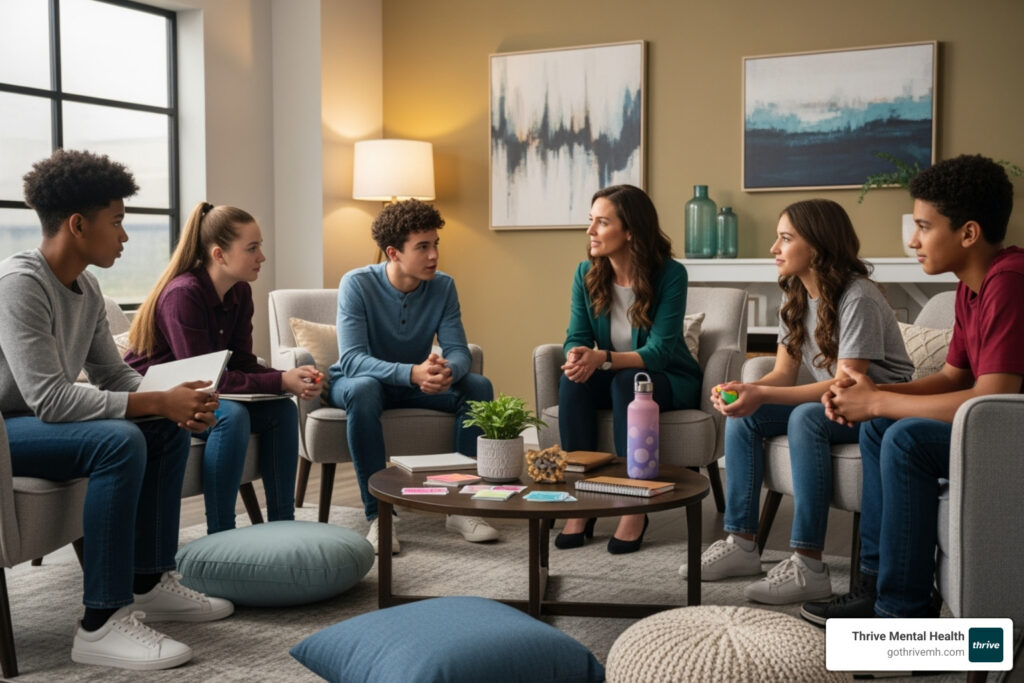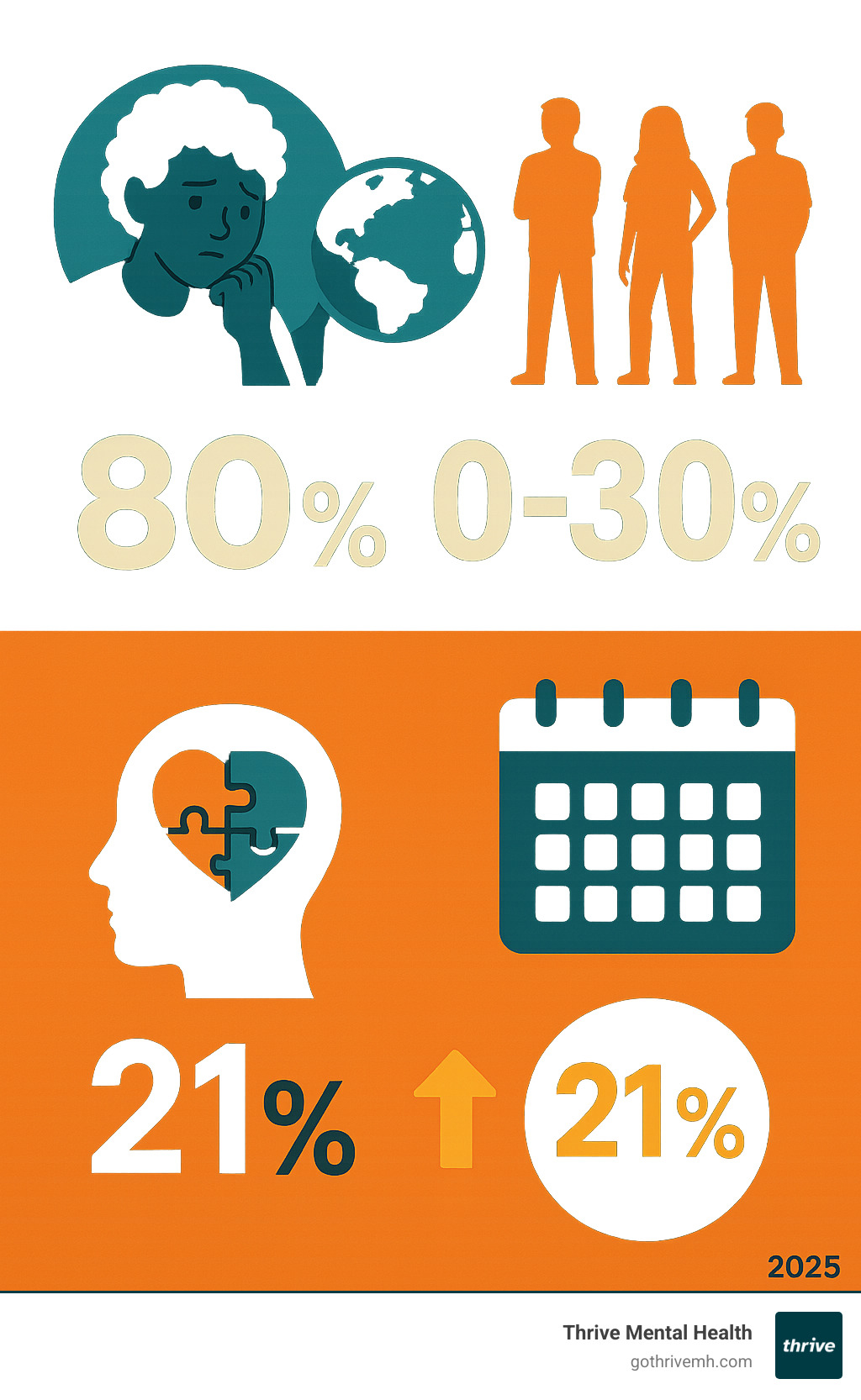Why Personalized Therapy is a Game-Changer for Teens

Why Traditional Therapy Falls Short for Today’s Teens
Personalized therapy for teens is changing how we approach adolescent mental health, moving beyond one-size-fits-all treatments to create truly individualized care plans. Unlike traditional therapy that follows standardized protocols, personalized therapy adapts to each teen’s unique personality, challenges, and goals.
What is Personalized Therapy for Teens?
- Individual Assessment: Comprehensive evaluation of the teen’s specific needs, strengths, and challenges
- Custom Treatment Plan: Custom combination of therapeutic techniques (CBT, DBT, mindfulness) based on the teen’s profile
- Flexible Approach: Treatment adapts as the teen grows and their needs change
- Collaborative Process: Teen, parents, and therapist work together to set goals and track progress
- Evidence-Based: Uses proven therapeutic methods but applies them in ways that fit the individual
The numbers tell a compelling story. Research shows that personalized interventions for adolescents demonstrate superior outcomes compared to standardized treatments, with effect sizes favoring personalized approaches. One study found that teens matched to interventions based on their specific risk profiles showed significantly greater decreases in depressive symptoms than those receiving mismatched treatments.
This matters because adolescence is a critical period of rapid biological, cognitive, and social change. Traditional therapy often treats teens like smaller adults, but their brains are still developing, their identities are forming, and they face unique pressures from social media, academic stress, and peer relationships.
The research is clear: teens are more likely to engage in therapy when they see it as customized to their specific situation. When treatment feels relevant to their lived experience, they’re more invested in the process and achieve better outcomes.
As Nate Raine, CEO of Thrive Mental Health, I’ve witnessed how personalized approaches transform teen mental health outcomes, particularly through our specialized programs that combine behavioral health expertise with individualized treatment planning. My experience leading Thrive has shown me that personalized therapy for teens isn’t just more effective – it’s essential for addressing the complex challenges today’s adolescents face, particularly here in our Florida communities.

Beyond One-Size-Fits-All: What Makes Teen Therapy “Personalized”?

Every teenager walks into therapy carrying their own story. Some are quiet observers who process the world internally. Others are natural performers who think out loud. Some come from families where emotions are discussed openly, while others have learned to keep feelings locked away. This incredible individual uniqueness is exactly why cookie-cutter approaches to teen mental health often miss the mark.
Personalized therapy for teens recognizes that your teenager isn’t just another case study from a textbook. Instead of moving beyond standard manuals that treat every teen with depression or anxiety the same way, we focus on understanding who your teen really is. What makes them laugh? What keeps them up at night? How do they learn best? These aren’t just nice-to-know details – they’re the foundation of effective treatment.
The difference is profound. Traditional therapy often starts with a diagnosis and then applies a predetermined treatment plan. Personalized therapy flips this approach entirely. We focus on the person, not just the diagnosis, building treatment around your teen’s strengths, interests, and natural way of connecting with the world.
This creates a dynamic and flexible approach that grows with your teenager. As they develop new insights about themselves or face different challenges, their therapy adapts too. It’s like having a treatment plan that breathes and evolves, rather than one carved in stone.
| Feature | Traditional “One-Size-Fits-All” Therapy for Teens | Personalized Therapy for Teens |
|---|---|---|
| Approach | Standardized protocols, fixed modules | Custom, flexible, adaptive |
| Focus | Diagnosis-driven, symptom reduction | Holistic, individual-driven, addressing root causes, enhancing self-awareness |
| Teen Engagement | Varies, can be low if irrelevant | High, due to customization and relevance |
| Interventions | Predetermined, limited flexibility | Custom mix of techniques (CBT, DBT, mindfulness, etc.), adapted to personality and learning style |
| Parental Involvement | Often structured, less flexible | Integrated, collaborative, balancing support with teen autonomy |
| Progress Monitoring | Standardized assessments | Continuous, adaptable, using measurement feedback systems (MFS) for real-time adjustments |
| Outcomes | Modest, may not address underlying issues | Superior, deeper, more sustainable change by targeting specific vulnerabilities and strengths |
How It Differs from Traditional Approaches
Here’s the honest truth about traditional therapy limitations: even the most well-researched treatment approaches only show small to medium improvements when applied broadly. Research reveals that teens receiving these standardized protocols have just a 58% chance of doing better than those receiving usual care. That’s barely better than a coin flip.
The problem isn’t that these treatments don’t work – it’s that they lack the flexibility to meet each teen where they are. Traditional approaches often follow rigid session-by-session guides, regardless of whether your teen is having a breakthrough week or struggling with a family crisis.
Personalized therapy’s focus on individual context changes everything. Instead of applying the same techniques to every anxious teen, we dig deeper. We explore your teen’s cultural background – understanding how their family’s values and traditions shape their worldview. We examine family dynamics – recognizing that the quiet teen from a large, loud family might need different support than the talkative teen from a reserved household.
We also pay attention to personal interests and communication style. Maybe your teen opens up while drawing, or processes emotions better through music, or connects more naturally through text messages between sessions. Some teens thrive with direct conversations, while others need time to warm up through shared activities.
This individualized approach isn’t just intuitive – it’s backed by solid science. Growing research in scientific research on personalized youth mental health shows that matching treatment approaches to individual teen characteristics leads to significantly better outcomes. We’re not just hoping for the best; we’re applying cutting-edge research to give your teen the most effective care possible.
The result? Therapy that feels relevant, engaging, and actually helpful to your teenager – not something they’re just enduring until they turn 18. This is the philosophy that guides our approach to teen therapy across our Florida locations, ensuring every adolescent receives care that truly fits.
The Tangible Benefits: How Custom Therapy Helps Teens Thrive
Picture this: a teenager who used to drag their feet to therapy sessions suddenly starts looking forward to them. They’re actively sharing their thoughts, trying new strategies, and even practicing skills at home. This change isn’t magic – it’s what happens when personalized therapy for teens truly connects with who they are as individuals.
The difference is remarkable. When therapy feels custom-made rather than cookie-cutter, teens become genuinely engaged in the process. They’re not just sitting through sessions; they’re actively participating because the approach speaks their language and addresses their real concerns.
This engagement leads to better outcomes across the board. A systematic review and meta-analysis found that personalized psychological interventions show superior treatment results compared to standardized approaches in adolescents, with benefits that last long after therapy ends. The research shows a meaningful effect size that translates to real improvements in teens’ daily lives.
But perhaps most importantly, personalized therapy empowers teens. Instead of feeling like passive recipients of treatment, they become active partners in their healing journey. They develop genuine resilience – not just coping mechanisms, but actual skill development that serves them well beyond their teenage years.
Addressing Anxiety and Depression
Every teen experiences anxiety and depression differently. Sarah might feel overwhelmed by social situations, while Marcus struggles with perfectionism in school. Personalized therapy for teens recognizes these differences and creates targeted coping strategies that actually make sense for each individual.
Rather than teaching generic relaxation techniques, we dig deeper to address root causes. Maybe the anxiety stems from family expectations, social media pressure, or past experiences. By understanding the “why” behind their feelings, we can help teens develop more effective ways to manage them.
Our approach might include cognitive restructuring to help a teen challenge those harsh inner critic voices, or behavioral activation to gradually re-engage a depressed teen with activities they once enjoyed. The key is matching the technique to the teen’s personality, learning style, and specific challenges.
Research backs up this personalized approach beautifully. One study on adolescent depression prevention found that teens matched to interventions based on their specific vulnerabilities – whether cognitive or interpersonal risks – showed significantly greater improvement than those who received mismatched treatments. It’s like having the right key for the right lock.
For families wanting to understand more about how depression affects teenagers, the National Institute of Mental Health provides comprehensive information on teen depression.
Improving Self-Esteem and Sense of Self
The teenage years can feel like living in a funhouse mirror – everything seems distorted, and it’s hard to see yourself clearly. Many teens we work with are caught up in constant comparison, whether with peers, social media influencers, or impossible standards they’ve set for themselves.
Personalized therapy for teens creates a safe space for exploring identity without judgment. We help teens step back from the noise and find who they really are beneath all those external expectations. This isn’t about boosting self-esteem with empty praise – it’s about building self-compassion and helping teens develop a genuine appreciation for their unique qualities.
We work together to recognize strengths they might not even realize they have. Maybe they’re naturally empathetic, creatively gifted, or incredibly resilient. By highlighting these authentic qualities, we help teens build a positive self-narrative that’s based on reality, not fantasy.
This process of self-findy is central to healthy development. When teens develop a stronger sense of who they are, they’re better equipped to make decisions that align with their values and steer peer pressure with confidence. You can learn more about building a stronger sense of self in teens on our blog.
Managing Behavioral Problems
Here’s something many parents don’t realize: most behavioral problems in teens are actually their way of communicating something they can’t put into words. When a teen is acting out, skipping school, or becoming defiant, there’s usually an underlying message about pain, frustration, or unmet needs.
Instead of just trying to stop the behavior, we focus on understanding triggers and teaching emotional regulation skills. We help teens recognize what sets them off and develop healthier ways to express their feelings before they reach a boiling point.
Improving communication skills becomes crucial here – not just with their therapist, but with family members, teachers, and friends. We practice having difficult conversations, expressing needs clearly, and working through conflicts constructively.
The beauty of this approach is that it’s collaborative problem-solving rather than adults imposing solutions. When teens feel heard and involved in finding answers, they’re much more likely to follow through. They start seeing themselves as capable of change rather than victims of their circumstances.
This collaborative approach extends to family work as well, helping everyone develop better ways to communicate and support each other through challenging times. It’s a cornerstone of the comprehensive care we provide in our teen therapy programs across Florida.
The Process Behind Personalized Therapy for Teens

At Thrive Mental Health, we see therapy as a collaborative journey, not a quick fix. While we strive for efficient and effective treatment, we also understand that lasting change takes time and dedication. Our process for personalized therapy for teens at our Florida locations is structured yet flexible, designed to adapt to the teen’s evolving needs while providing a clear path forward.
The Initial Assessment and Goal-Setting
Every personalized therapy journey begins with a comprehensive assessment. This isn’t just a brief chat; it’s a deep dive into the teen’s world. We gather information from both the teen and their parents or caregivers, creating a holistic picture of their challenges, strengths, and aspirations. This might involve consultations where we discuss family dynamics, current struggles, and past experiences. Some programs might even include a 30-day assessment and intervention period to truly get to know the teen and understand what works best for them.
This initial phase is crucial for identifying key strengths that can be leveraged in therapy, as well as pinpointing specific areas for growth. Based on this thorough evaluation, we engage in collaborative goal-setting. This means working with the teen, not just for them, to establish realistic and attainable objectives. This collaborative approach fosters ownership and commitment, creating a therapeutic roadmap that feels relevant and meaningful to the teen.
Monitoring Progress and Adjusting the Plan
Therapy isn’t a static process; it’s dynamic. That’s why continuous progress monitoring is a cornerstone of our personalized approach. We use various methods, including measurement feedback systems (MFS), which are designed to track symptoms and successes in real-time. These systems administer assessments and provide feedback on treatment progress, allowing us to see how the teen is responding to interventions.
Regular check-ins with the teen and their family are vital. This ongoing dialogue allows us to track symptoms, celebrate successes, and identify any new challenges that may arise. Based on this feedback, we adjust therapeutic techniques as needed, ensuring the treatment plan remains relevant and effective. This iterative process ensures that we’re always fine-tuning our approach to best support the teen’s unique journey toward well-being. If something isn’t working, we change it – because your teen’s progress is our priority.
A Collaborative Approach to Teen Wellness

Here at Thrive Mental Health, we truly believe that helping a teen thrive is a group effort! Personalized therapy for teens isn’t just about the time spent in therapy sessions. It’s about building a strong support system around the teen. Think of it like a team working together. The teen is always right in the middle, and around them are their therapist, parents, caregivers, and, when it makes sense, even their school. This way, everyone is on the same page, sending consistent messages of support.
Common Therapeutic Techniques Used
Our skilled therapists know a lot of ways to help. They pick and choose different tools and blend them together just for your teen. It’s like having a custom toolkit! This way, we can use what works best for your teen’s unique personality and how they learn.
Here are some of the helpful techniques we often use in personalized therapy for teens:
- Cognitive Behavioral Therapy (CBT): This helps teens spot and change unhelpful thoughts and actions that cause them trouble. For example, a teen worried about school might learn to challenge their “I’m going to fail!” thoughts.
- Dialectical Behavior Therapy (DBT): This therapy teaches important skills like staying calm, handling strong feelings, getting along better with others, and coping with tough times. It’s super helpful for teens who feel emotions very strongly.
- Mindfulness-Based Stress Reduction (MBSR): Mindfulness teaches teens to pay attention to the here and now without judging themselves. This can help them manage stress, focus better, and understand themselves more.
- Family Systems Therapy: We know a teen’s feelings are often connected to their family life. This approach brings the whole family together to improve how everyone talks, solves problems, and creates a more supportive home.
- Art and Music Therapy: Sometimes, it’s hard for teens to put their feelings into words. These creative ways to express themselves offer a safe space to share complex emotions, work through experiences, and feel better about themselves.
These aren’t just used “off the shelf.” Instead, they are carefully chosen and woven into a plan that fits your teen’s personality, what they like, and how they best learn.
The Crucial Role of Parents and Caregivers
Parents and caregivers are super important in the personalized therapy for teens journey. While we always respect your teen’s privacy and help them grow into their own person, we also encourage parents to be actively involved. This might mean having family sessions to help everyone communicate better or to work through big changes.
We also work with parents to give them tools to support what their teen is learning in therapy at home. This helps create a steady, supportive environment. Talking openly with the therapist, while still respecting your teen’s private space, is key. We understand it’s a balance, and our therapists are here to guide families through it.
Collaborating with Schools and Other Professionals
A teen’s life isn’t just about home and therapy. School and other professionals play a big part too! We often work with school counselors, teachers, and other important people like pediatricians or psychiatrists. This helps us get a full picture of how your teen is doing in different places.
This teamwork also means we can help make sure your teen gets any school help they need, like academic accommodations. A joined-up effort means your teen gets consistent support everywhere. This team approach is especially strong in our intensive outpatient (IOP) and partial hospitalization (PHP) programs offered here in Florida. It ensures teens get thorough support in all parts of their lives.
Is Personalized Therapy Right for Your Teen?

It takes incredible courage to acknowledge that your teen might be struggling and needs a little extra support. Adolescence is a whirlwind of change, growth, and new challenges. Sometimes, the pressures of school, friends, social media, and just growing up can feel too heavy for a teen to carry alone. That’s where personalized therapy for teens comes in. It’s a guiding light, offering custom support that truly understands their unique world and helps them not just cope, but truly thrive.
Signs Your Teen Might Benefit
It’s often tough for parents to tell the difference between typical teenage moodiness and signs that professional help could make a real difference. If you’re wondering if personalized therapy for teens might be right for your child, look for these common indicators:
You might notice a persistent sadness or hopelessness, where your teen seems down most of the time, loses interest in activities they once loved, or expresses feelings of worthlessness. Perhaps there’s been an increase in irritability or anger, leading to frequent outbursts, unexplained aggression, or a struggle to control their temper.
Another common sign is withdrawal from friends and activities. Your teen might start isolating themselves, avoiding social situations, or showing a lack of interest in hobbies they once enjoyed. Keep an eye out for changes in sleep or eating habits, like a significant increase or decrease in sleep, difficulty falling asleep, or noticeable shifts in appetite or weight.
Academic struggles can also be a red flag, such as a decline in school performance, including a sudden drop in grades, difficulty concentrating, increased truancy, or a general avoidance of school. They might also show difficulty coping with daily life, feeling overwhelmed by everyday tasks, struggling with stress, or expressing thoughts like “I don’t care anymore.” In some cases, you might even observe risky behavior, like impulsivity, experimenting with drugs or alcohol, self-harm, or engaging in other dangerous activities. Lastly, frequent physical complaints such as headaches or stomachaches, without a clear medical cause, can sometimes point to underlying stress or anxiety.
If you’ve noticed several of these signs, it’s a strong indication that your teen could benefit from the custom support that personalized therapy offers.
Practical Steps to Accessing Personalized Therapy for Teens
Taking that first step to seek help can feel overwhelming, but we’re here to make the process as clear and smooth as possible.
First, focus on finding the right therapist. Look for professionals who specialize in adolescent mental health and truly accept a personalized approach. Consider their experience, therapeutic style, and whether they offer an initial consultation. This can be a great way to ensure a good fit for your teen and your family.
You’ll also want to consider virtual vs. in-person options. Thanks to advancements in telehealth, virtual therapy offers incredible accessibility and flexibility, which can be a huge plus for busy teens and families. Many teens actually feel more comfortable opening up from the familiarity and privacy of their own home. Online counseling provides benefits like digital familiarity and consistency of care. However, in-person options are also available, and the best choice often depends on your teen’s preference and specific needs. At Thrive Mental Health, our comprehensive programs in Florida, including intensive outpatient (IOP) and partial hospitalization (PHP) options, are available both virtually and in-person, offering flexible, expert-led, evidence-based care custom to individual needs.
Don’t forget to inquire about cost and insurance considerations. We understand that mental health care is an important investment. Many providers, including Thrive Mental Health, accept a range of insurances to help reduce financial barriers and make care more accessible.
Finally, when you’re ready to take action, focus on finding specialized programs in Florida. As a provider with locations in Tampa Bay, St. Petersburg, Central Florida, and across the state, Thrive Mental Health is dedicated to offering accessible, high-quality personalized therapy for teens. We understand the unique pressures faced by adolescents in our communities and offer specialized programs designed to meet their needs. You can find more info about our teen therapy programs specifically designed for young people in our service areas.
Conclusion
So, as we’ve explored, personalized therapy for teens isn’t just another approach; it’s a profound shift in how we support our young people. It’s about truly seeing and understanding each adolescent as an individual, with their own unique story, challenges, and strengths. By moving away from rigid, one-size-fits-all methods, we can offer support that truly resonates, making therapy a place where teens feel heard, understood, and genuinely engaged.
This custom approach helps teens not only heal from current struggles but also build incredible resilience and a stronger sense of self that will serve them for years to come. It’s an investment in their future – equipping them with vital coping skills and the confidence to steer life’s complexities long after therapy ends.
At Thrive Mental Health, this commitment to custom care is at the heart of everything we do. Our virtual and in-person intensive outpatient (IOP) and partial hospitalization (PHP) programs in Florida are built on this very philosophy. We believe every teen deserves care that fits them perfectly, guiding them towards a future where they can truly thrive.
If you’re ready to explore how personalized therapy for teens can make a real difference for your family, we invite you to connect with us. Let’s work together to help your teen build a foundation for lasting well-being. Contact us to learn more about our personalized programs for teens.
